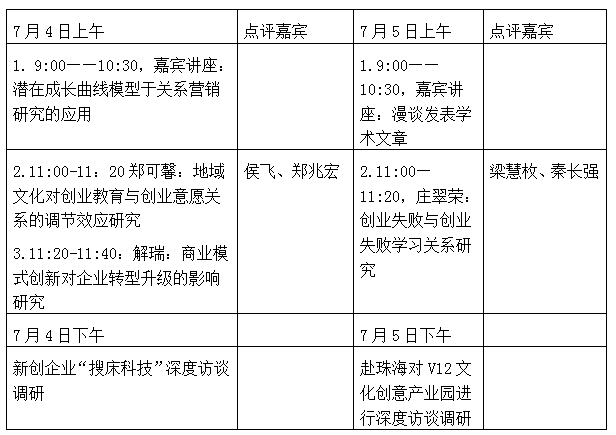会议主题:前言理论与方法研讨
会议时间:2018年7月4日至7月5日
会议地点:管理学院第二会议室
会议日程:

主题报告1:潜在成长曲线模型于关系营销研究的应用
报告人:郑兆宏
报告人简介:
郑兆宏简介:台湾屏东县人,1978年生,台湾中山大学企业管理学系博士,现任台湾高雄科技大学国际企业学系助理教授、美国营销学会会员、SSCI期刊审稿委员,普考华语领队人员及格;主要研究兴趣包括服务业营销、关系营销、消费者心理、手机成瘾行为、统计与研究方法等议题。近五年发表SSCI学术论文十余篇,包括Journal of Services Marketing, Journal of Service Management, Journal of Business Ethics, Computers in Human Behavior, Food Quality and Preference, Social Science Computer Review, Asian Journal of Social Psychology, Behaviour & Information Technology等国际权威学术期刊。曾荣获中山大学104 学年度博士研究生优秀毕业论文,并多次获台湾科技部补助参加营销领域重要国际会议。
报告内容简介:
综观现有关系营销(Relationship Marketing)文献,学者已提出诸多理论观点,试图解释顾客关系如何影响顾客忠诚行为及公司绩效,例如基于承诺-信任理论(Commitment-Trust Theory)所提出的顾客信任、承诺,以互惠理论(Reciprocity Theory)为基础的顾客感恩和关系质量,以社会认同理论(Social Identity Theory)发展而出的顾客认同感等。尽管文献指出顾客与企业的关系并非一成不变,而应是会随时间而产生不同变化,大多数的研究仍停留在以静态观点描述顾客关系,意即所有研究变量仅测量一次即进行理论模型验证,此作法既无法确保因果关系,亦无法有效观察顾客关系的变化情形。Palmatier et al. (2013)认为在预测顾客未来行为与公司绩效上,关系变动比起传统静态观点作法更能提供精确信息,作者进一步以关系承诺为例,在企业对企业(B2B)研究背景下,搜集六年期的追踪资料,并使用潜在成长曲线模型(latent growth curve model, LGCM)克服传统分析时间性作法(即检验关系阶段或关系长度所造成的关系差异)的诸多限制,并于后续研究建议中指出,未来研究应以潜在成长曲线模型来探讨其它重要关系构念。LGCM属于结构方程模型的进阶应用,可以满足重复测量资料的相关分析问题,此次讲座将为大家分享此分析工具基本概念及相关应用,以及本人采用LGCM所发展的相关研究。
主题报告2:漫谈发表学术文章
报告人:梁慧枚教授
报告人学术简介:
RESEARCH INTERESTS.
Innovation Management、Quantitative Methods
PUBLICATIONS
Refereed Academic Journals
Hueimei Liang, Rui-Hsin Kao, Chung-Cheng Tu, Chang-Chiang Chin, Wu-Chung Chung, "The Influence of Education and Training on Work Attitudes and the Moderating Effect of Supervisor Attitudes: Examining Chinese Employees", Social Indicators Research. (2014) 119:853–875 (SSCI,impact factor 1.452, Social Science,21/137 Q1, Interdisciplinary 12/92, Q1)
Hueimei Liang, Kuo-Jung Lee, Ten-Jsung Huang, Hsien-Wei Lei, The optimal decisions in franchising under profit uncertainty, Economic Modelling 31 (2013) 128–137 (SSCI,impact factor, 0.834, journal ranking 0.498)
Hueimei Liang, Chan-Fu Chuang, Cho-Miao Chen, (2012), Exploring the Effects of Sharing Information on Expected Cost under the VMI Model, Journal of E-Business JEB电子商务学报, vol 14, issue 2, 2012,06 (TSSCI)
Shu-Cheng Lee, Hueimei Liang, Chang-yung Liu, (2011),The effects of Absorptive Capacity, Knowledge Sourcing Strategy and Alliance Forms on Firm performance. The service Industries Journal, 2011, vol 31, Issue 3 (SSCI,impact factor, 2.58)
Jen-Jsung Huang, Kuo-Jung Lee , Hueimei Liang, & Wei-Fu Lin (2009)Estimating Value at Risk of Portfolio by Conditional Copula-GARCH Method, Insurance: Mathematics and Economics ISSN: 0167-6687 Volume 45 Issue 3 December 2009 (SSCI,impact factor 1.453, SJR ranking 1.175) (Q1)
Chin, C.-C. & Liang, H.-M. (2009). The long-run uncovered interest rate parity in view of a trading strategy, Applied Economics, 41(21), 2727-2739 (SSCI, impact factor 0.518)
Liang, Huei-mei (1999) “Service Station Factor in Monotonicity of Retrial Queues” Mathematical and Computer Modelling; 189 – 196 (impact factor 2.020) (SCI)
Liang, Hueimei and V. G. Kulkarni (1999), “Optimal Routing Control in Retrial Queues”, Applied Probability and Stochastic Processes; edited by Shanthikumar and Sumita; pp191-202.
Kulkarni, V. G. and Hueimei Liang (1997), “Retrial Queues Revisited” 19 – 34, Frontiers of Queueing: Models and Applications in Science and Engineering, CRC Press.
Liang, Huei-mei and V. G. Kulkarni (1993) “Stability Condition for a Single-Server Retrial Queue” Advances in Applied Probability 25, 690-701. (Impact factor 0.8) (SCI)
Liang, Huei-mei and V. G. Kulkarni (1993) “Monotonicity Properties of Single-Server Retrial Queues” Stochastic Models 3(3), 373-400. (impact factor 0.6) (SCI)
Cases Hueimei Liang, Ting Yu, Chung-Cheng Tu, “Crisis Management Strategy”, Ivey Publishing. (12 December, 2017)
报告内容简介:
结合自己和他人的经验,归纳如何做好学术文章,并发表在国际普遍认可的顶级期刊上的经验与心得。内容大概包括如下几个部分:
1 什么是好文章。
2 如何找到好题目。
3 为什么做文献探讨。
4 怎么找资料
5 怎么处理资料。
6 如何写出吸引人的文章。
7 投稿策略
欢迎各位教师、博士生、硕士生参加!
科研管理办公室
2018年6月9日